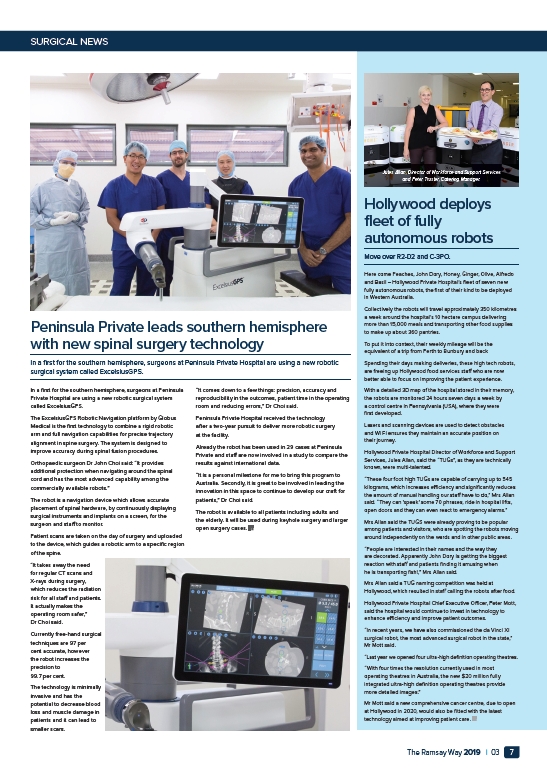
Jules Allan, Director of Workforce and Support Services
and Peter Trusler, Catering Manager.
The Ramsay Way 2019 | 03 7
SURGICAL NEWS
Peninsula Private leads southern hemisphere
with new spinal surgery technology
In a first for the southern hemisphere, surgeons at Peninsula Private Hospital are using a new robotic
surgical system called ExcelsiusGPS.
In a first for the southern hemisphere, surgeons at Peninsula
Private Hospital are using a new robotic surgical system
called ExcelsiusGPS.
The ExcelsiusGPS Robotic Navigation platform by Globus
Medical is the first technology to combine a rigid robotic
arm and full navigation capabilities for precise trajectory
alignment in spine surgery. The system is designed to
improve accuracy during spinal fusion procedures.
Orthopaedic surgeon Dr John Choi said: “It provides
additional protection when navigating around the spinal
cord and has the most advanced capability among the
commercially available robots.”
The robot is a navigation device which allows accurate
placement of spinal hardware, by continuously displaying
surgical instruments and implants on a screen, for the
surgeon and staff to monitor.
Patient scans are taken on the day of surgery and uploaded
to the device, which guides a robotic arm to a specific region
of the spine.
“It takes away the need
for regular CT scans and
X-rays during surgery,
which reduces the radiation
risk for all staff and patients.
It actually makes the
operating room safer,”
Dr Choi said.
Currently free-hand surgical
techniques are 97 per
cent accurate, however
the robot increases the
precision to
99.7 per cent.
The technology is minimally
invasive and has the
potential to decrease blood
loss and muscle damage in
patients and it can lead to
smaller scars.
“It comes down to a few things: precision, accuracy and
reproducibility in the outcomes, patient time in the operating
room and reducing errors,” Dr Choi said.
Peninsula Private Hospital received the technology
after a two-year pursuit to deliver more robotic surgery
at the facility.
Already the robot has been used in 29 cases at Peninsula
Private and staff are now involved in a study to compare the
results against international data.
“It is a personal milestone for me to bring this program to
Australia. Secondly, it is great to be involved in leading the
innovation in this space to continue to develop our craft for
patients,” Dr Choi said.
The robot is available to all patients including adults and
the elderly. It will be used during keyhole surgery and larger
open surgery cases.
Hollywood deploys
fleet of fully
autonomous robots
Move over R2-D2 and C-3PO.
Here come Peaches, John Dory, Honey, Ginger, Olive, Alfredo
and Basil – Hollywood Private Hospital’s fleet of seven new
fully autonomous robots, the first of their kind to be deployed
in Western Australia.
Collectively the robots will travel approximately 350 kilometres
a week around the hospital’s 10 hectare campus delivering
more than 15,000 meals and transporting other food supplies
to make up about 360 pantries.
To put it into context, their weekly mileage will be the
equivalent of a trip from Perth to Bunbury and back
Spending their days making deliveries, these high tech robots,
are freeing up Hollywood food services staff who are now
better able to focus on improving the patient experience.
With a detailed 3D map of the hospital stored in their memory,
the robots are monitored 24 hours seven days a week by
a control centre in Pennsylvania (USA), where they were
first developed.
Lasers and scanning devices are used to detect obstacles
and Wi Fi ensures they maintain an accurate position on
their journey.
Hollywood Private Hospital Director of Workforce and Support
Services, Jules Allan, said the “TUGs”, as they are technically
known, were multi-talented.
“These four foot high TUGs are capable of carrying up to 545
kilograms, which increases efficiency and significantly reduces
the amount of manual handling our staff have to do,” Mrs Allan
said. “They can 'speak' some 70 phrases, ride in hospital lifts,
open doors and they can even react to emergency alarms.”
Mrs Allan said the TUGS were already proving to be popular
among patients and visitors, who are spotting the robots moving
around independently on the wards and in other public areas.
“People are interested in their names and the way they
are decorated. Apparently John Dory is getting the biggest
reaction with staff and patients finding it amusing when
he is transporting fish!,” Mrs Allan said.
Mrs Allan said a TUG naming competition was held at
Hollywood, which resulted in staff calling the robots after food.
Hollywood Private Hospital Chief Executive Officer, Peter Mott,
said the hospital would continue to invest in technology to
enhance efficiency and improve patient outcomes.
“In recent years, we have also commissioned the da Vinci XI
surgical robot, the most advanced surgical robot in the state,”
Mr Mott said.
“Last year we opened four ultra-high definition operating theatres.
“With four times the resolution currently used in most
operating theatres in Australia, the new $20 million fully
integrated ultra-high definition operating theatres provide
more detailed images.”
Mr Mott said a new comprehensive cancer centre, due to open
at Hollywood in 2020, would also be fitted with the latest
technology aimed at improving patient care.